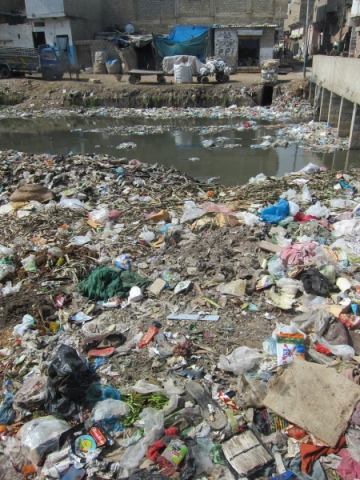
This is where they live.
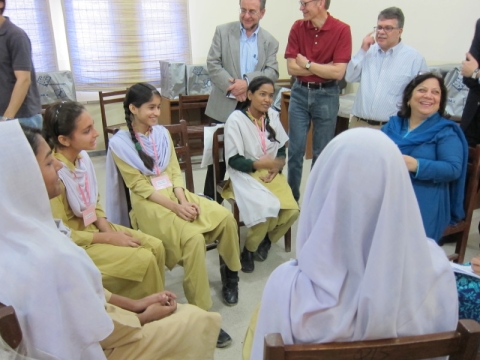
Eighth-grade girls and their mentor (American Journalists onlooking) at an NGO school outside Karachi.
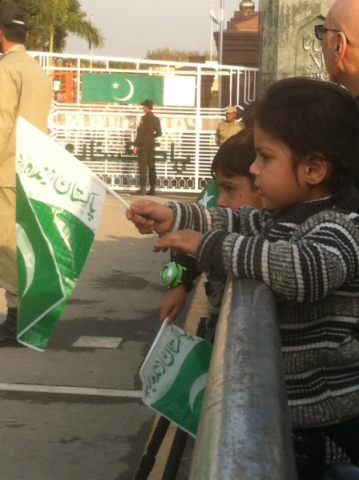
Children at the Wagah Border Ceremony.
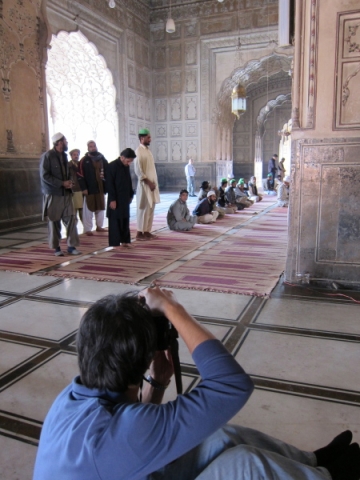
Our photographer, Mudabbir Maajid, at the mosque in Lahore.
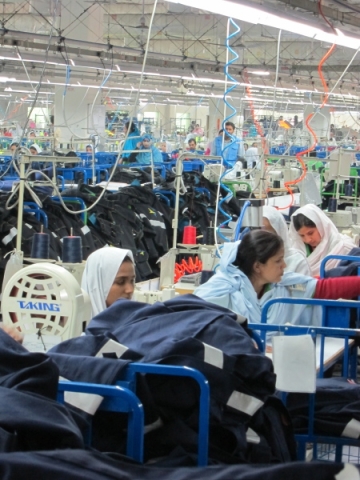
Women at a textile factory outside Lahore.
It was an extraordinary trip to Pakistan – a whirlwind two weeks filled with dozens upon dozens of meetings – meetings with government officials, news executives, journalists, NGOs and even an artist or two. We were wined, dined, gifted and feted. We were welcomed extravagantly, generously, sometimes lovingly. We made business contacts and we made friends. We saw amazing sights – from the ancient ruins at Taxila and extraordinary art to security checkpoints and blockades.
We learned that Pakistan is a complicated, feudal society. One that spans millennia, and has many nuances: tribal, western, Chinese, Persian and more. We learned that Pakistan is a nation in which the rich are very rich and the poor are painfully poor.
We learned that Pakistan’s educational system is broken. Roughly 60% of the population is literate. Too many girls are not educated past fifth grade; too many millions of children are not educated at all. We heard repeatedly that millions of dollars of U.S. aid to train teachers has been wasted. On any given day, we were told, 25% of teachers don’t show up to teach. They take the salary while children sit at their desks, their potential going to waste. And their minds prey to extremist propaganda. Fix the educational system, we were told, and you fix the country’s militant problem.
We visited one non-governmental school on our last day in Karachi. A clean, new building with teachers educating the local children – children born and raised on a garbage dump – their parents eking out an existence so poor that their sons work before school and after. One boy we met was in 8th grade. He had gray hair.
We learned that Pakistan’s government, at least, believes its women are among the most integrated of developing nations. Women hold roles in government and work more than ever outside the home – as journalists, teachers, professionals. Although in some tribal and poorer areas, this is not the case.
We learned that Pakistan has paid a great cost for its part in the War on Terror. More than 36,000 people killed. Security everywhere, millions of citizens displaced, sectarian violence rising, an economy in shambles. Domestic products, we were told, are desperate for entry into the United States and other foreign markets – textiles, agricultural and natural resources stuck in limbo. The textile industry alone is about half of the nation’s GDP. It has been devastated by the war and global recession. Thousands of workers, many of them women, are now unemployed.
We learned that Pakistan’s energy crisis is at the heart of an international stalemate. The country is desperately short of energy – its grid unable to handle generated capacity and its power generation woefully short of demand. The energy crisis affects everything – from industry to agriculture to the running of the government. Those with money cover several power outages daily with their own generators. For those without, life comes to a halt. The government wants to import energy from Iran via a gas pipeline that the United States opposes.
Such complicated relations with the United States, we learned, are not unusual and are not welcome. Pakistan may be a U.S. ally against terrorism, we were told, but until the United States treats Pakistan as an independent equal, the two will not be friends. Friendship and respect were very important themes. Relations between the two nations are precarious at best, and we learned from both Washington and Islamabad, there is no simple fix. Many Pakistanis reminded us the “November border incident” in which U.S. forces killed Pakistani soldiers has not been forgiven.
Above all, we heard, Pakistan is stumbling toward true democracy. The explosion of its news media (warts and all) with the burgeoning independence of its judiciary indicates the country may be moving beyond military dictatorship and repression. This is a time of hope for Pakistan, we were told; let people know at what a democratic crossroads we have arrived. Pakistanis urged us to strike a blow at Americans’ stereotype of their country as a nation of terrorists and double-dealers. There is so much more to report, they told us.
Stereotypes of the United States are common in Pakistan’s news media. University of Texas, Austin professor Dominic Lasorsa recently reminded me of the power they hold. Stereotypes are an easy, predictable, comfortable picture of the world and our place in it. If what we see meets our expectations, the stereotype is reinforced. If not, one’s perspective may be fundamentally altered. A sloppy – even deceptive – journalist relies on stereotypes. A good one reports what she sees. These past two weeks in Pakistan have shattered any stereotypes I might have held and possibly, our presence there and the continuation of this program may help shatter theirs.